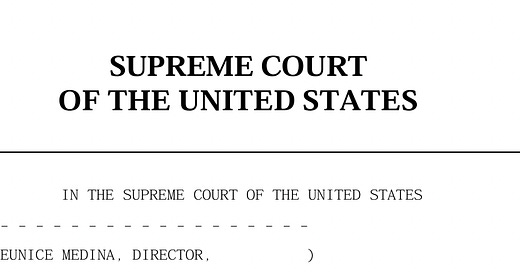Supreme Court hears challenge over Medicaid reimbursements for abortion
Challenge grew out of a South Carolina executive order that denied clinics funding because the governor said it subsidized abortions.
On Wednesday, the Supreme Court heard arguments about whether South Carolina can block abortion clinics from receiving Medicaid reimbursements.
Medina v Planned Parenthood South Atlantic grew out of a legal challenge to a 2018 executive order issued by South Carolina Gov. Henry McMaster that denied those funds to clinics because he said it subsidized abortions.
The debate centers on a federal provision in the Medicaid laws that dictates recipients have the right to choose a qualified provider who accepts their insurance.
John J. Bursch, a lawyer with the antiabortion Alliance Defending Freedom, which represented South Carolina, spoke on behalf of the state. He argued that Medicaid beneficiaries cannot sue if they believe the guarantee has been violated. Bursch argued before judges that states can determine which providers are “qualified.”
One of the more illuminating parts of the hearing was Chief Justice John Roberts's question to Bursch about what remedies he would recommend for both the provider and patient when reimbursement was denied.
“One of the benefits provided by the Act is that you may choose your own doctor. If a person thinks that's not being provided, what remedies do they have?” Roberts asked.
“They have a very specific remedy,” Bursch said. “ If they are denied benefits, there's an administrative appeal process that they can go through. But there is a separate remedy for providers who are disqualified. They also have an administrative appeal that could go through the state court system, and that could come to this Court if necessary.”
Kyle D. Hawkins, counselor for the Solicitor General, spoke to the court as an amicus curiae supporting South Carolina’s argument. He explained to the judges that their brief argued that Congress must have unmistakable right-creating language to establish it.
Nicole Saharsky represented Planned Parenthood in the case. One of the more telling parts was an exchange between her and Justice Elena Kagan on South Carolina’s actions.
“What this statute is all about is allowing states to do that and then giving individuals no ability to come back and say, ‘That’s wrong. I’m entitled to see my provider of choice regardless of what they think about contraception or abortion or gender transition treatment,” Kagan said.
“That is absolutely right,” Saharsky said.
The hearing transcript is below.




